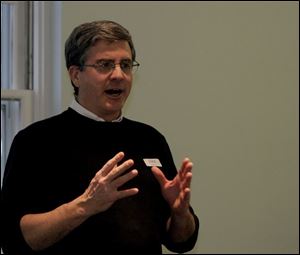
Multifaith council honing its vision
1/15/2005
The Rev. Dirk Ficca, head of the Council for a Parliament of World Religions, speaks to an interfaith gathering in Toledo.
Sometime in the next few months, volunteers from the MultiFaith Council of Northwest Ohio will fan out across the region and knock on the doors of several hundred religious, government, and civic leaders to conduct what are known as "appreciative inquiry interviews."
Once the interviews are finished and their results are compiled into a report, the council will proceed to the next step: a "visioning conference."
In laymen's terms, the fledgling Toledo-area interfaith group wants to learn what is important to the movers and shakers in the religious community, then find ways to promote peace and harmony among the area's diverse religious and ethnic groups.
The Rev. Dirk Ficca, chief executive officer of the Council for a Parliament of World Religions (CPWR), has taken a personal interest in the Toledo project, volunteering his time to help local interfaith efforts get rolling. He drove from Chicago to Toledo to hold an orientation session in December and two this week to train a core of "listener leaders" who will conduct the interviews.
"The diversity in Toledo is quite astounding for a relatively small community," the Rev. Ficca said during his introduction to a training session at Pilgrim United Church of Christ on Tuesday. "And the interfaith council here is quite active."
His organization is working with multifaith groups in 40 cities around the world, he said, including Capetown, South Africa; Taipei, Taiwan, and Barcelona, Spain, where the quadrennial Parliament of World Religions was held in July.
In Chicago, where the Parliament was established in 1993, the Rev. Ficca said he conducted appreciative inquiry interviews with more than 400 local leaders.
After a brief personal introduction and explanation by the interviewer, the inquiry proceeds with open-ended questions designed to draw out positive aspects of a person's job, ministry, or goals in nonthreatening, nonjudgmental ways.
Among the proposed questions, which may still be revised, are: "What is most important about what you do?," and, "What is your vision of a better Toledo and northwest Ohio?"
The Rev. Ficca cautioned volunteers not to interrupt the interviewee or to offer their own opinion on the issues.
This is a disciplined process of inquiry, not a dialogue. I m not here to share my views. I m here to inquire about yours, he said.
He said the people he interviewed in Chicago often were skeptical at first, expecting him to unleash a hidden agenda. But after
earning their trust, he said, the subjects tended to open up and
shared their thoughts and goals.
From having done 400 of these, I was the one enriched, the Rev. Ficca said.
In his own experience, he said he found that three basic principles are necessary for multifaith efforts to succeed:
• Harmony, not unity. We are not reducing differences
to our commonalities. We respect the uniqueness of each religious community and tradition, he said.
• Convergence, not consensus. There is no list of 10
things you have to believe. We will never agree on certain principles
or belief systems.
• Facilitation, not structure. There are no offi cial memberships,
and no criteria to join, and no defi nition of a religion, the Rev. Ficca said. In the tenuous world of interfaith relations, he said, these
principles work about 70 to 80 percent of the time and have been very helpful to us in Chicago.
The Rev. Ficca said the concept of appreciative inquiry interviews was developed at Case Western University in Cleveland as a tool for determining the values, interests, and aspirations of a multifaith
community.
He said that after serving 12 years as Presbyterian pastor in
Benton Harbor, Mich., and after being married and raising two
sons, and spending the last 11 years as head of the CPWR, he
has become convinced that I can convince no one of anything.
In light of that, the Rev. Ficca said, it is essential to find out
what people already are convinced of. Different religious groups can disagree about beliefs and traditions, the Rev. Ficca said, yet still trust one another.
I m convinced that the fate of the world rests on this, he
said in regard to trust.
In the West, we tend to focus on agreement. We need to look
more at trust. Building that trust is what the visioning process
is all about. Some projects that help reach that goal are
no-brainers, he said, such as feeding the hungry or building
houses for the poor.
But he also has learned that it is wise to avoid some things, including interfaith prayer services.
For some, interfaith dialogue implies compromise, he said. We don t believe in interfaith prayer or worship. These groups
cannot pray or worship together. They are very distinct.
The timeline is for the interviews to be completed by this spring and the visioning conference held in the fall.
Information on the Multi-Faith Council of Northwest Ohio is available online at www.multifaithcouncil.org or by calling Mr. Trautman at 419-
215-4312.